You are using an out of date browser. It may not display this or other websites correctly.
You should upgrade or use an alternative browser.
You should upgrade or use an alternative browser.
Iran
- Thread starter Azur
- Start date
Солдаты НАТО плакали! — стали известны «жуткие» детали удара Ирана по базе США (ВИДЕО)
13.01.2020 - 16:21
Translation
NATO soldiers were crying! — became known "terrible" details of Iran's strike on the US base (VIDEO)
13.01.2020 - 16: 21
13.01.2020 - 16:21
Translation
NATO soldiers were crying! — became known "terrible" details of Iran's strike on the US base (VIDEO)
13.01.2020 - 16: 21
Солдаты НАТО плакали! — стали известны «жуткие» детали удара Ирана по базе США (ВИДЕО)The Danish Sergeant spoke in an interview with local media about how much fear he and his fellow soldiers suffered when Iran bombed the American base of ain al-Assad.
According to a soldier named John, six hours before the attack, the Danish government and defense Forces knew about the impending missile strike. John and other soldiers were notified of the impending attack, they went down to the bunker in advance, where they waited out the attacks of the forces of the Islamic revolutionary guard Corps (IRGC).
"The first blow was a surprise. Hit 9 missiles with a capacity of a ton each. It was indescribable."
"I've never experienced anything like this, and I hope I never experience it again. It was a brutal attack.
The attack was so strong that the bunker was shaking, and a lot of dust got inside, "the Danish Sergeant shared the" horrors " of the experience.
We will emphasize once again: everyone knew about the attack, the military personnel were warned in advance. The command gave the order to all personnel to take shelter in the equipped bunker. At the same time, the Iranian missile strike still became a "terrifying experience"for the soldiers from Western countries.
"We had to sit with scarves on our faces to breathe. Worst of all was the ignorance and impotence of the Danish soldiers in the face of the expectation of new attacks. We didn't know where or when the next rocket would fall," John complained to reporters.
"We could just sit and wait. We couldn't do what we were prepared for. We could have just waited, " John lamented.
According to him, the Danish soldiers reacted differently. Someone tried to keep up their spirits, make jokes, and tell jokes to "protect" themselves.
"Some clung to each other, and some cried," admitted the Danish Sergeant.
After the Iranian attack on American bases, Sergeant John and 133 of his faint-hearted comrades-in-arms were sent from Iraq to Kuwait. Military psychologists were sent to them to help Danish soldiers recover from their experiences.
"We really need them. It was a situation for which we were not prepared, " John complained to reporters.
"It is a little alarming for the Danish army if a well-known blow, which they waited out in advance in a protected bunker, became a terrifying experience for them, after which they needed a psychologist.
It is terrible to imagine what would have happened to them if Iran had struck without warning, " Boris Rozhin, an expert at the center for military and political journalism, commented on the ridiculous situation in his telegram channel Solonelcassad.
In addition to the details of the missile attack on American bases in Iraq, the Danish Sergeant said that several helicopters were destroyed at the base, the loss of which the Pentagon did not say.
"I would say that the nearest missile fell 300 feet (91 meters) away from us, and when we passed (there) afterwards, there were helicopters torn in half, and the holes are so large that you could Park a van in them," said the Danish Sergeant.
Note that Denmark is not the only country that has decided to evacuate its contingent from Iraq. Earlier, Russian Spring reported that for security reasons, Germany decided to move some of its troops from Iraq to Jordan and Kuwait.
Slovakia can also recall its military to its homeland. Even earlier, the US began to withdraw its military contingent from Iraq.
Tension between US and Iran far from over, says former diplomat
January 12, 2020 Snip 9-11 minutes Oil & Gas 360
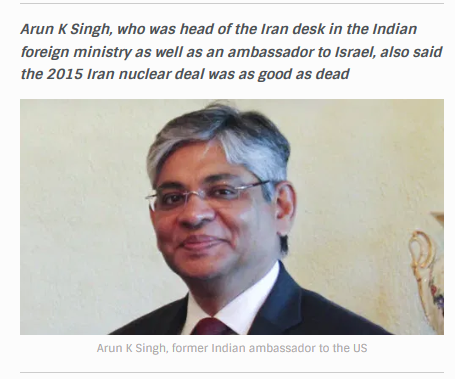
NEW DELHI : There may have have been a de-escalation in the confrontation between the US and Iran for the time being, but tensions will continue to simmer, thanks to maneuvering, and proxy or cyber attacks by US and Iran against each other, says Arun K Singh, former Indian ambassador to the US.
Singh, who was head of the Iran desk in the Indian foreign ministry as well as an ambassador to Israel, also said the 2015 Iran nuclear deal was as good as dead, with fresh talks required to resurrect it. Though India has been careful not to side with Iran or the US, its deep interlinkages with the US economy and financial systems compel India to circumscribe its ties with Iran.
Edited excerpts:
1) Is the present confrontation over, you think, or is there potential for a new flare up any time soon?
Both Iran and US have signaled that they want to walk back from the current escalatory phase. After the US drone strike that killed the Iranian evolutionary Guards’ Al- Quds force leader Qasem Suleimani, US President (Donald) Trump and Secretary of State (Mike) Pompeo had spoken of de-escalation. Iranian leaders first spoke of a proportionate response, and then of de-escalation after their missile strikes. The Iranian response was carefully calibrated. It showed technological capability, precision, took place within Iraq where the US attack had been, and was directly attributable to Iran. US was able to claim that it suffered no casualties, and thus could avoid a response. Reports also suggest that the Iranians had informed Iraq’s Prime Minister in advance, signaling a sensitivity to Iraqi sovereignty, and differentiating itself from US which had not given Iraqis advance notice. There is some speculation that the Iraqis had forewarned the US of the impending attack, and that US intelligence had also picked up signs of preparation of such an attack. However, this does not mean that tension, maneuvering, and proxy or cyber attacks by US and Iran against each other’s interests have come to an end. US continues with its stringent economic sanctions depriving Iran of billions of dollars of oil and other revenue, designating as terrorists many of its leaders and government entities, and the two countries have adversarial interests in Iraq, Syria, Afghanistan and Israel- Palestine.
2) What do you see as the future for the West Asia region? Iran seems pretty clear that they want the US forces out of the region and the US seems keen on a withdrawal. President Trump mentioned an increased role for NATO there. How do you that playing out?
When US troops had initially moved into Afghanistan in 2001, after 9/11, Iran had seen some advantage to itself from the Taliban being driven out of power, and had not been hostile to the arrival of US forces. However, their attitude changed when US President George Bush, in his State of Union address in 2002, described Iran as one of the “Axis of Evil” along with Iraq and North Korea. Similarly, Iran gained from US displacing Saddam Hussain in Iraq in 2003 and paving the way for majority Shia dominance in that country. Both competed, in adversarial manner, for influence over the post Saddam political and security structures. They had convergence of interest in the fight against ISIS, but are arraigned on opposite sides in Syria. Given US economic and other pressure, Iran would clearly see a threat from a dominating US physical presence in its neighborhood. Trump had also waged his 2016 Presidential campaign on ending US involvement in “endless wars”, and would ideally like to showcase US draw down as the 2020 campaign picks up. But he cannot be seen to have retreated out of weakness. Drawdown in Afghanistan has stalled, as have negotiations with the Taliban. If NATO steps up involvement and number of troops in Iraq, it would provide Trump the fig leaf to reduce number of US troops. However, NATO was conceived largely for European operations, against the Soviet and later the Russian challenge. It did not perform well in its first “out of area operations”, in Afghanistan, and essentially remained dependent on US strategy, infrastructure and was confined to supporting roles such as in training and advising Afghan forces. Also, there is political opposition in the European NATO members to involvement outside Europe, although they may want to avoid giving Trump another reason for criticizing NATO as ineffective or wasteful, or NATO not doing enough and leaving the heavy lifting all to the US.
Why U.S.-Iran Feud Keeps Focus on Strait of Hormuz
January 10, 2020, 6:00 AM GMT+1 / 8-10 minutes Snip:
The Strait of Hormuz is once again a center of global tensions. The Middle East’s crude oil and natural gas flow through the narrow sea conduit to international markets, making it the world’s most critical transportation “chokepoint.” Incidents there — such as Iran’s seizure of a British tanker and attacks on ships in 2019 — can whipsaw energy prices and send shipping and insurance rates rocketing. Regional tensions flared again after the U.S. killed a top Iranian general in January 2020 and some shippers briefly avoided sending vessels through the strait. The Islamic Republic has periodically threatened to shut the vital waterway, prompting the U.S. and U.K. to step up their military presence amid calls to ensure it stays open.
1. Where is the Strait of Hormuz?
Shaped like an inverted V, the waterway connects the Persian Gulf to the Indian Ocean, with Iran to its north and the United Arab Emirates and Oman to the south. It’s about 96 miles (154 kilometers) long and 21 miles wide at its narrowest point, with the shipping lanes in each direction just two miles wide. Its shallow depth makes ships vulnerable to mines, and the proximity to land — Iran, in particular — leaves large tankers open to attack from shore-based missiles or interception by fast patrol boats and helicopters.
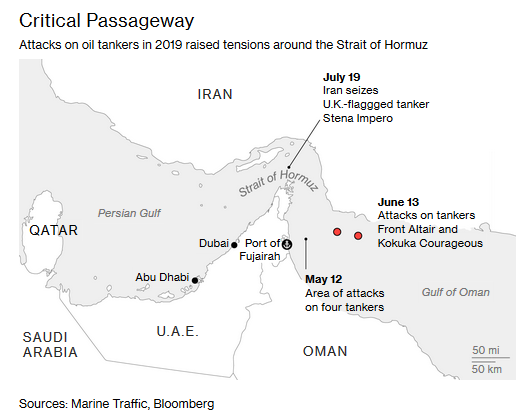
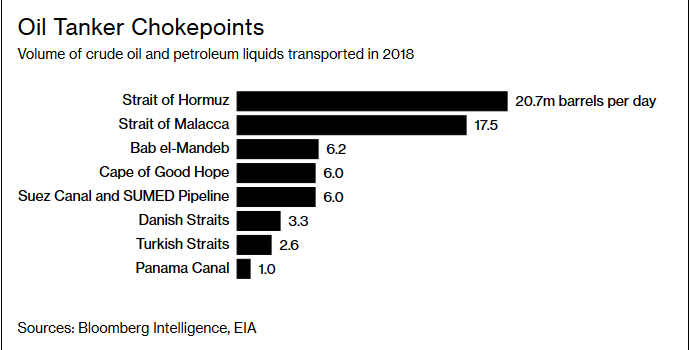
3. Why would Iran disrupt the strait?
4. Could Iran really close the waterway?
Strait of Hormuz - A Timeline of 2019 Events
5. Has the strait been closed to traffic before?
6. Can the strait be protected?
7. Who relies most on the strait?
The Reference Shelf
The Secretary of State for Europe and France, Jean-Yves Loudrian, hosted in Paris yesterday Mr Josep Borrell, Heiko Moss and Dominique Robb to discuss the situation in the Middle East. Collective support for the Brotherhood, for reducing tension and for regional stability
According to him, the Danish soldiers reacted differently. Someone tried to keep up their spirits, make jokes, and tell jokes to "protect" themselves.
"Some clung to each other, and some cried," admitted the Danish Sergeant.
If this is true and they're not using this for Public Relations purposes and sympathy, maybe they now can realize, with just a small taste, how those who are being bombed in other countries (Palestine, Syria, Yemen etc.) feel on a continual basis.
angelburst29
The Living Force
Why U.S.-Iran Feud Keeps Focus on Strait of Hormuz
January 10, 2020, 6:00 AM GMT+1 / 8-10 minutes Snip:
The Strait of Hormuz is the world's busiest oil-shipping channel and there are no plans by Iran to block it. And if Iran isn't going through enough hardship and problems, due to the assassination of Soleimani and the Ukrainian Plane crash, France, Britain and Germany have decided to trigger "the dispute mechanism" in the Iran Nuclear Deal? No compassion or remorse for what that Government has gone through in less then two weeks!
Iran won't target Strait of Hormuz over Soleimani killing: analysts
Iran is unlikely to block the Strait of Hormuz, the world's busiest oil-shipping channel, in reprisal for the killing of Qassem Soleimani for fear of aggravating its Gulf allies and China, regional analysts said on Monday.
France, Britain, Germany to trigger Iran deal dispute mechanism: diplomats
France, Britain and Germany plan to trigger on Tuesday the dispute mechanism in the Iran nuclear deal following renewed violations by Tehran of the 2015 accord, two European diplomats said on Tuesday.
How the Iran nuclear deal dispute mechanism works
France, Britain and Germany formally triggered the dispute mechanism in Iran's nuclear deal with world powers on Tuesday, the strongest step they have taken so far to enforce the agreement that requires Iran to curb its nuclear program.
UK open to broader Iran deal that tackles destabilizing behavior: Raab
Britain is willing to work with the United States and European partners to build a broader initiative which would address not just Iran's nuclear ambitions but its destabilizing activity in the region, Foreign Minister Dominic Raab said on Tuesday.
foreign minister Dominic Raab said on Tuesday.
Iran dismisses European move to trigger nuclear deal dispute mechanism
Iran dismissed a decision by European states to trigger a dispute mechanism in its nuclear deal with world powers as a "passive" action but said it was ready to consider any constructive effort to save the accord.
Russia sees no grounds to trigger Iran nuclear deal dispute mechanism: TASS
Russia sees no grounds to trigger the dispute mechanism in Iran's 2015 nuclear deal with world powers, TASS news agency reported on Tuesday, citing Russia's Foreign Ministry.
European powers in nuclear deal using dispute mechanism is a 'strategic mistake' - Zarif
The triggering of a dispute mechanism on Tuesday by France, Britain and Germany in the multilateral nuclear deal with Iran is a "strategic mistake", Iran's Foreign Minister Mohammad Javad Zarif said, according to the semi-official Fars news agency.
U.S. supports Europe's Iran move on dispute mechanism but calls on it to fully abandon the deal: envoy
The United States supports Europe's move to initiate the dispute mechanism in Iran's nuclear deal, the U.S. top envoy for Iran told Reuters on Tuesday, but would like to see Europeans join Washington in its efforts to diplomatically isolate Tehran.
Netanyahu: Israel will not allow Iran to achieve nuclear weapons
Israeli Prime Minister Benjamin Netanyahu said on Tuesday that Israel will not allow Iran to obtain nuclear weapons and called on Western countries to impose "snapback sanctions" on Tehran.
Schumer says believes majority of U.S. Senate backs Iran war powers resolution
U.S. Senate Democratic leader Chuck Schumer said on Tuesday he believed a majority of 51 U.S. senators will approve a war powers resolution to block President Donald Trump from further military action, which would be a rebuke of the president's policy in the Republican-controlled chamber.
Democrats say measure to rein in Trump on Iran will pass Senate
U.S. Senate Democrats said on Tuesday they had enough votes in the Republican-controlled Senate to pass a resolution curbing President Donald Trump's ability to wage war on Iran without congressional approval, which would be a rebuke of the President after he ordered a strike that killed an Iranian commander in Iraq.
angelburst29
The Living Force
Tensions in the Gulf have risen following the U.S. killing of Iranian military commander General Qassem Soleimani and a retaliatory missile attack by Iran on U.S. forces in Iraq.
Russia says urging Gulf nations to consider a joint security mechanism
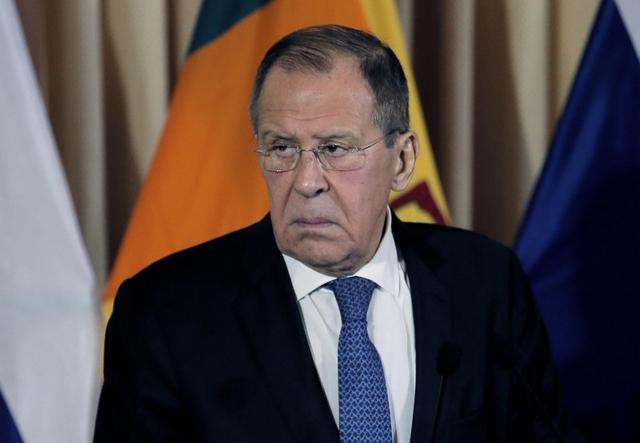
Russia's Foreign Minister Sergey Lavrov said on Wednesday Moscow has been urging Gulf countries to consider a common security mechanism for the region.
“We have been suggesting to the Gulf countries to think about collective security mechanisms ... starting with confidence building measures and inviting each other to military exercises,” Lavrov told a security conference in Delhi.
“Since I mentioned about Persian Gulf, we are very much concerned about what is going in there,” Lavrov said.
Trump agrees with British PM Johnson on a 'Trump deal' for Iran
U.S. President Donald Trump said he agreed with a comment by British Prime Minister Boris Johnson that a "Trump deal" should replace the Iran nuclear deal.
Russia says urging Gulf nations to consider a joint security mechanism
Russia's Foreign Minister Sergey Lavrov said on Wednesday Moscow has been urging Gulf countries to consider a common security mechanism for the region.
“We have been suggesting to the Gulf countries to think about collective security mechanisms ... starting with confidence building measures and inviting each other to military exercises,” Lavrov told a security conference in Delhi.
“Since I mentioned about Persian Gulf, we are very much concerned about what is going in there,” Lavrov said.
Iran’s Foreign Minister Mohammad Javad Zarif is also attending the conference in Delhi that comes just a day after Britain, France and Germany formally accused Iran of violating the terms of its 2015 agreement to curb its nuclear program, which eventually could lead to the reimposing of U.N. sanctions.
Iran’s Fars news agency quoted Zarif as saying overnight that the use of the dispute mechanism was legally baseless and a strategic mistake.
Lavrov said unilateral sanctions were a problem in today’s world.
“So the 21st century is the time when we must get rid of any methods of dealing in international relations which smack of colonial and neo-colonial times. And sanctions, unilaterally imposed sanctions, they are not going to work.”
After pulling out of the Iran deal, the United States slapped sanctions back on Iran and has gradually increased its “maximum pressure” campaign targeting the Islamic Republic’s revenues from oil, mining and other industries.
British Prime Minister Boris Johnson called on Tuesday for U.S. President Donald Trump to replace the Iranian nuclear deal with his own new pact to ensure the Islamic Republic does not get an atomic weapon.
Trump said in a tweet he agreed with Johnson for a “Trump deal”.
U.S. Deputy National Security Adviser Matthew Pottinger will also be addressing the Delhi meeting on Thursday.
Trump agrees with British PM Johnson on a 'Trump deal' for Iran
U.S. President Donald Trump said he agreed with a comment by British Prime Minister Boris Johnson that a "Trump deal" should replace the Iran nuclear deal.
This is actually a possible outcome, some of the conscientious voters and politicians might think about it. What the PM and the Government did was to move 100 of the 130 Danish soldiers temporarily to a military base in Kuwait. Perhaps it is even a way of saying to the US, yes we know we have to participate in this nonsense, but you create a lot of problems to make it worse than it needed to be.If this is true and they're not using this for Public Relations purposes and sympathy, maybe they now can realize, with just a small taste, how those who are being bombed in other countries (Palestine, Syria, Yemen etc.) feel on a continual basis.
Over the years Europe has taken abuse from the US, but in general insights gained are in some quarters minuscule. In a similar way there are also people from Iran, that in spite of all that the US is doing around the world, still think it would be nice if Washington toppled the present Government, as if the people of Iran would benefit.
angelburst29
The Living Force
Disgraceful admission, Mnuchin! Don't know, if you're into the annuls of Financial History or not, but "your kind" got thrown OUT of the Temple, once upon a time, for some of the same practices. As for History, it has a habit of repeating itself! The hour - draws near.
Stephen Mnuchin noted that through sanctions Washington has now managed to "cut off probably over 95% of the oil revenues" of Iran.
US wants China to stop buying Iranian oil - US Treasury
US wants China to stop buying Iranian oil - US Treasury
NEW YORK, January 13, 2020 - US officials are consulting with Chinese colleagues to cut off oil supplies from Iran to China, US Treasury Secretary Stephen Mnuchin told Fox News.
He noted that through sanctions Washington has now managed to "cut off probably over 95% of the oil revenues" of Iran. According to Mnuchin, at present, China accounts for a significant part of the remaining oil exports of Iran.
"I sat down with the Chinese officials. They flew in a delegation to meet with us and the State Department to talk about this. They've cut off all of the state companies from buying oil, and we're working closely with them to make sure that they cease all additional oil activities," Mnuchin said.
Mnuchin noted that the United States had previously imposed sanctions on a number of Chinese firms transporting Iranian oil.
U.S. expects U.N. sanctions on Iran to 'snap back into place': Treasury Secretary
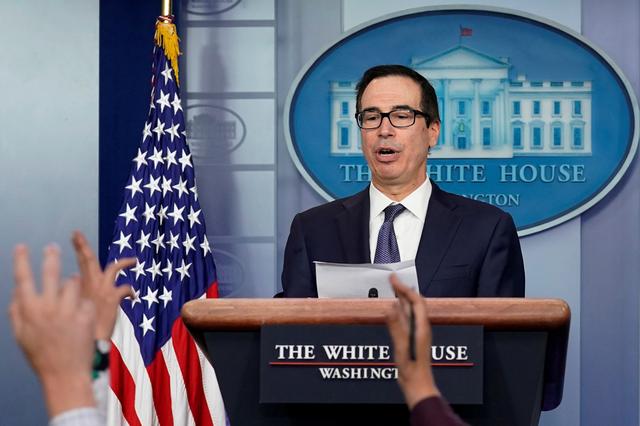
The United States believes international sanctions on Iran will be swiftly reimposed now that France, Britain and Germany have formally triggered a mechanism to help enforce Iran's nuclear agreement, Treasury Secretary Steven Mnuchin said on Wednesday.
Iran rejects idea of a new 'Trump deal' in nuclear row
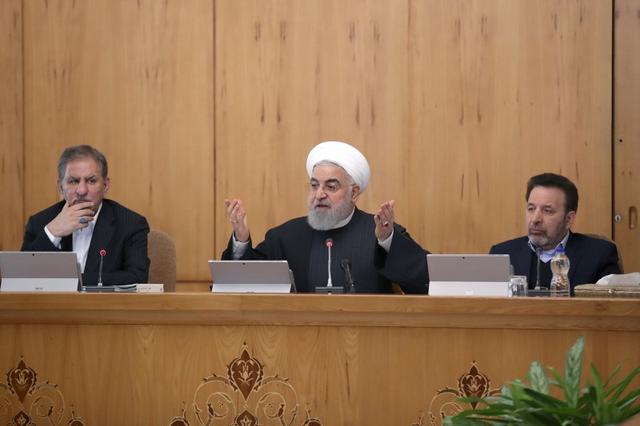
Iranian President Hassan Rouhani dismissed on Wednesday a proposal for a new "Trump deal" aimed at resolving a nuclear row, saying it was a "strange" offer and criticizing U.S. President Donald Trump for always breaking promises.
Iranians bury dead from downed plane after days of rage on the street
Iranians buried their dead from an airliner shot down by the military as authorities on Wednesday identified more of the 176 victims of last week's crash, which led to days of rage against Iran's rulers followed by a police crackdown.
Canada investigators to examine Iran crash wreckage later on Wednesday - Ottawa
Crash investigators from Canada have visited the site of an Iranian plane disaster in which 57 Canadians died and will examine the wreckage later on Wednesday, said Transport Minister Marc Garneau.
Ukraine asks Iran to return black boxes from crashed plane
Ukraine's prosecutor's office and security service have asked Iranian authorities to give Kiev black boxes from the crashed Ukrainian plane, the prosecutors office said on Wednesday.
Stephen Mnuchin noted that through sanctions Washington has now managed to "cut off probably over 95% of the oil revenues" of Iran.
US wants China to stop buying Iranian oil - US Treasury
US wants China to stop buying Iranian oil - US Treasury
NEW YORK, January 13, 2020 - US officials are consulting with Chinese colleagues to cut off oil supplies from Iran to China, US Treasury Secretary Stephen Mnuchin told Fox News.
He noted that through sanctions Washington has now managed to "cut off probably over 95% of the oil revenues" of Iran. According to Mnuchin, at present, China accounts for a significant part of the remaining oil exports of Iran.
"I sat down with the Chinese officials. They flew in a delegation to meet with us and the State Department to talk about this. They've cut off all of the state companies from buying oil, and we're working closely with them to make sure that they cease all additional oil activities," Mnuchin said.
Mnuchin noted that the United States had previously imposed sanctions on a number of Chinese firms transporting Iranian oil.
U.S. expects U.N. sanctions on Iran to 'snap back into place': Treasury Secretary
The United States believes international sanctions on Iran will be swiftly reimposed now that France, Britain and Germany have formally triggered a mechanism to help enforce Iran's nuclear agreement, Treasury Secretary Steven Mnuchin said on Wednesday.
Iran rejects idea of a new 'Trump deal' in nuclear row
Iranian President Hassan Rouhani dismissed on Wednesday a proposal for a new "Trump deal" aimed at resolving a nuclear row, saying it was a "strange" offer and criticizing U.S. President Donald Trump for always breaking promises.
Iranians bury dead from downed plane after days of rage on the street
Iranians buried their dead from an airliner shot down by the military as authorities on Wednesday identified more of the 176 victims of last week's crash, which led to days of rage against Iran's rulers followed by a police crackdown.
Canada investigators to examine Iran crash wreckage later on Wednesday - Ottawa
Crash investigators from Canada have visited the site of an Iranian plane disaster in which 57 Canadians died and will examine the wreckage later on Wednesday, said Transport Minister Marc Garneau.
Ukraine asks Iran to return black boxes from crashed plane
Ukraine's prosecutor's office and security service have asked Iranian authorities to give Kiev black boxes from the crashed Ukrainian plane, the prosecutors office said on Wednesday.
angelburst29
The Living Force
Leader of the Islamic Revolution Ayatollah Seyed Ali Khamenei warned of extensive Western attempts at persuading the Iranian nation to cave in to the US’ pressures.
Leader Warns of Western Plot to Force Iran to Give In to US Pressures
Leader Warns of Western Plot to Force Iran to Give In to US Pressures - Politics news - Tasnim News Agency
February, 15, 2020 - Speaking in a gathering of eulogists on the birth anniversary of Lady Fatimah (PBUH), held in Tehran on Saturday, Ayatollah Khamenei cautioned about the plots hatched by Western think tanks and the extensive Western media campaign for persuading the Iranian nation to give in to the US pressures.
“The Iranian nation has stood firm (against the enemies) so far, by God’s grace, and will continue to stand as well, but such resistance requires a constant injection of spiritual force into the society,” the Leader underlined.
Iran’s Zarif, ECFR Members Meet in Germany
Iran’s Zarif, ECFR Members Meet in Germany - Politics news - Tasnim News Agency
February, 15, 2020 - During the Saturday meeting on the sidelines of the 2020 Munich Security Conference, Zarif and the ECFR exchanged views about a range of issues, including ways to boost cooperation between the two sides.
In separate meetings on Friday, Zarif held talks with his counterparts from Canada, Finland, China, Croatia, and Oman.
Zarif also met with the representatives of The Elders, an international non-governmental organization that was founded by anti-apartheid icon Nelson Mandela.
The 56th Munich Security Conference (MSC) kicked off in the southern German city of Munich on Friday and will run through Sunday.
The annual conference, known as the “Davos” of global security and political events, has been an important forum for top officials to discuss major issues facing the world since its inception in 1963.
The theme this year is “Westlessness,” the loss of the common standing of what it means to be part of the West, according to a security report published on Monday.
Saudi minister: Iran must change behavior before any talks
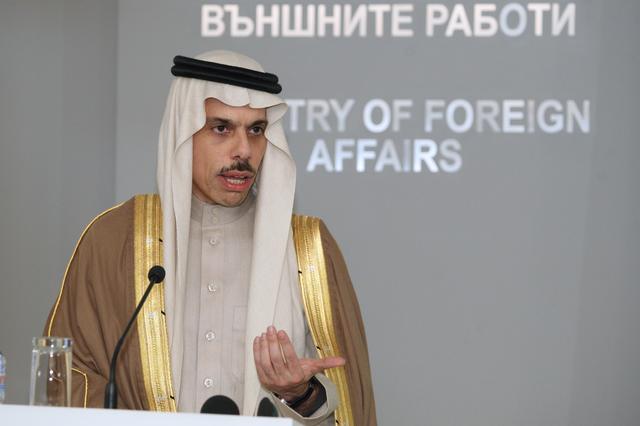
Saudi Arabia's foreign minister said on Saturday no private messages or direct contact had taken place to ease tensions with Iran
and that Tehran first needed to change its behavior before talks can happen.
White House memo says strike on Iranian commander responded to past attacks
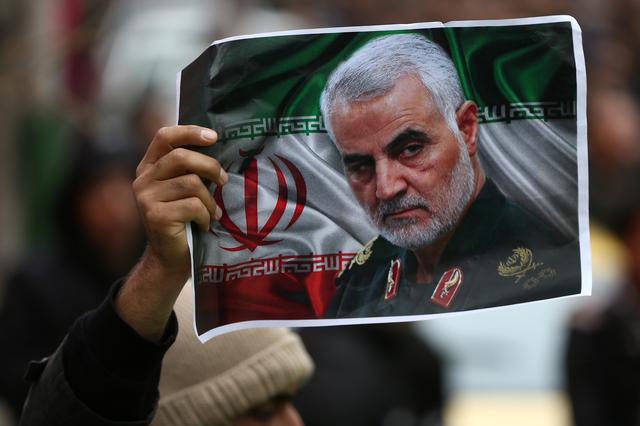
President Donald Trump ordered a drone strike that killed a top Iranian military commander last month in response to past attacks, the White House said in a memo released on Friday, despite previous administration assertions that it was due to an imminent threat.
Leader Warns of Western Plot to Force Iran to Give In to US Pressures
Leader Warns of Western Plot to Force Iran to Give In to US Pressures - Politics news - Tasnim News Agency
February, 15, 2020 - Speaking in a gathering of eulogists on the birth anniversary of Lady Fatimah (PBUH), held in Tehran on Saturday, Ayatollah Khamenei cautioned about the plots hatched by Western think tanks and the extensive Western media campaign for persuading the Iranian nation to give in to the US pressures.
“The Iranian nation has stood firm (against the enemies) so far, by God’s grace, and will continue to stand as well, but such resistance requires a constant injection of spiritual force into the society,” the Leader underlined.
Iranian Foreign Minister Mohammad Javad Zarif held talks with members of the European Council on Foreign Relations (ECFR) in Germany’s Munich about issues of mutual interest.
Iran’s Zarif, ECFR Members Meet in Germany
Iran’s Zarif, ECFR Members Meet in Germany - Politics news - Tasnim News Agency
February, 15, 2020 - During the Saturday meeting on the sidelines of the 2020 Munich Security Conference, Zarif and the ECFR exchanged views about a range of issues, including ways to boost cooperation between the two sides.
In separate meetings on Friday, Zarif held talks with his counterparts from Canada, Finland, China, Croatia, and Oman.
Zarif also met with the representatives of The Elders, an international non-governmental organization that was founded by anti-apartheid icon Nelson Mandela.
The 56th Munich Security Conference (MSC) kicked off in the southern German city of Munich on Friday and will run through Sunday.
The annual conference, known as the “Davos” of global security and political events, has been an important forum for top officials to discuss major issues facing the world since its inception in 1963.
The theme this year is “Westlessness,” the loss of the common standing of what it means to be part of the West, according to a security report published on Monday.
Saudi minister: Iran must change behavior before any talks
Saudi Arabia's foreign minister said on Saturday no private messages or direct contact had taken place to ease tensions with Iran
and that Tehran first needed to change its behavior before talks can happen.
White House memo says strike on Iranian commander responded to past attacks
President Donald Trump ordered a drone strike that killed a top Iranian military commander last month in response to past attacks, the White House said in a memo released on Friday, despite previous administration assertions that it was due to an imminent threat.
angelburst29
The Living Force
Former U.N. Secretary-General Perez de Cuellar dies aged 100

Former U.N. Secretary-General Javier Perez de Cuellar, a Peruvian diplomat who played a crucial role in ending the Iran-Iraq war of 1980 to 1988, died on Wednesday at his home in Lima aged 100.
Iran says IAEA case for inspecting sites based on fake Israeli intel
Iran on Thursday stood by its decision to deny U.N. nuclear inspectors access to sites where they have questions about past activities, arguing that the agency's case is based on "fabricated" Israeli intelligence.
Pompeo says Iran must be held accountable on nuclear commitments
U.S. Secretary of State Mike Pompeo on Thursday called on all nations to hold Iran accountable for its nuclear commitments and said Tehran's failure to report nuclear material was a clear violation of safeguard agreements.
Former U.N. Secretary-General Javier Perez de Cuellar, a Peruvian diplomat who played a crucial role in ending the Iran-Iraq war of 1980 to 1988, died on Wednesday at his home in Lima aged 100.
Iran says IAEA case for inspecting sites based on fake Israeli intel
Iran on Thursday stood by its decision to deny U.N. nuclear inspectors access to sites where they have questions about past activities, arguing that the agency's case is based on "fabricated" Israeli intelligence.
Pompeo says Iran must be held accountable on nuclear commitments
U.S. Secretary of State Mike Pompeo on Thursday called on all nations to hold Iran accountable for its nuclear commitments and said Tehran's failure to report nuclear material was a clear violation of safeguard agreements.
angelburst29
The Living Force
Even with additional U.S. sanction, Iran continues to move ahead within it's own Policies and National Security.
Iran's supreme leader to pardon 10,000 prisoners, including political ones
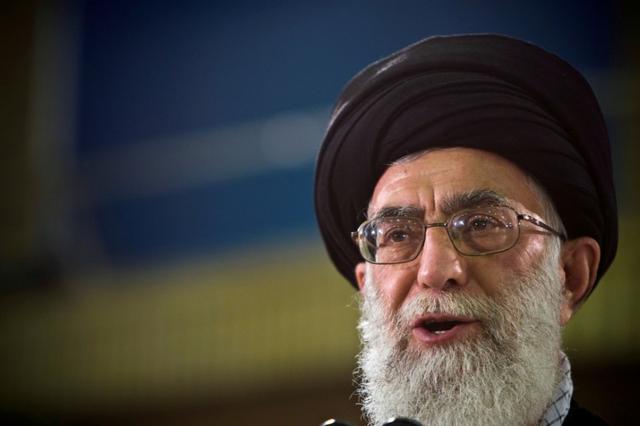
Iran's Supreme Leader Ayatollah Ali Khamenei will pardon 10,000 prisoners including political ones in honor of the Iranian new year on Friday, state TV reported.
Iran, France agree on release of prisoners, Iranian judiciary website
Iran and France have agreed to release a French citizen held in Iran, and an Iranian detained in France on charges linked to violating U.S. sanctions against Tehran, the Iranian judiciary said on its website on Friday.
U.S. issues new Iran-related sanctions: Treasury website
The United States imposed fresh Iran-related sanctions on Thursday, targeting five firms, the Treasury Department said on its website.
The firms include Petro Grand FZE, Alphabet International DMCC, Swissol Trade DMCC, Alam Althrwa General Trading LLC, and Alwaneo LLC Co., according to the website.
Khamenei lauds Iranians' 'dazzling' sacrifices to fight virus
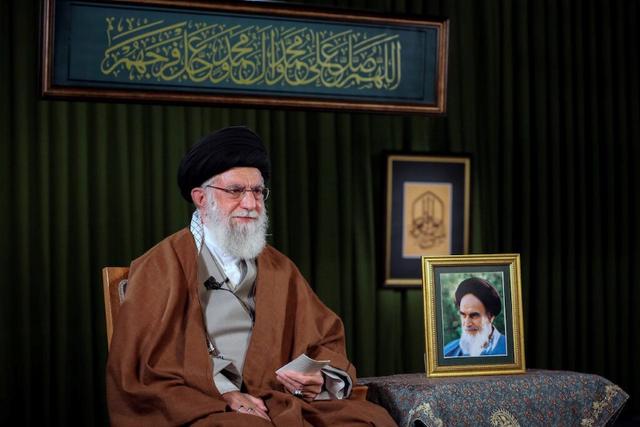
Iran's Supreme Leader Ayatollah Ali Khamenei, in a speech on state television for the Persian New Year, praised Iranians for their "dazzling" sacrifices in fighting the coronavirus outbreak in the worst-hit country in the Middle East.
Iran coronavirus death toll jumps 149 to 1,433: health ministry
Iran's death toll from the new coronavirus outbreak rose by 149 to 1,433 on Friday, a health ministry official tweeted, adding that that total number of confirmed infections had increased by 1,237 to 19,644.
Iran's supreme leader to pardon 10,000 prisoners, including political ones
Iran's Supreme Leader Ayatollah Ali Khamenei will pardon 10,000 prisoners including political ones in honor of the Iranian new year on Friday, state TV reported.
Iran, France agree on release of prisoners, Iranian judiciary website
Iran and France have agreed to release a French citizen held in Iran, and an Iranian detained in France on charges linked to violating U.S. sanctions against Tehran, the Iranian judiciary said on its website on Friday.
U.S. issues new Iran-related sanctions: Treasury website
The United States imposed fresh Iran-related sanctions on Thursday, targeting five firms, the Treasury Department said on its website.
The firms include Petro Grand FZE, Alphabet International DMCC, Swissol Trade DMCC, Alam Althrwa General Trading LLC, and Alwaneo LLC Co., according to the website.
Khamenei lauds Iranians' 'dazzling' sacrifices to fight virus
Iran's Supreme Leader Ayatollah Ali Khamenei, in a speech on state television for the Persian New Year, praised Iranians for their "dazzling" sacrifices in fighting the coronavirus outbreak in the worst-hit country in the Middle East.
Iran coronavirus death toll jumps 149 to 1,433: health ministry
Iran's death toll from the new coronavirus outbreak rose by 149 to 1,433 on Friday, a health ministry official tweeted, adding that that total number of confirmed infections had increased by 1,237 to 19,644.
'This is the last warning': Iranian air defenses almost fired on U.S. F-18 fighter jet.

 www.almasdarnews.com
2020-03-22
www.almasdarnews.com
2020-03-22

Iranian military nearly fired on US F-18 jet: video
BEIRUT, LEBANON (7:00 P.M.) - The Iranian military nearly opened fire on a U.S. F-18 Super Hornet jet three days ago after the latter did not obey the
'This is the last warning': Iranian air defenses almost fired on U.S. F-18 fighter jet.
2020-03-22
Iranian military nearly fired on US F-18 jet: video
BEIRUT, LEBANON (7:00 P.M.) - The Iranian military nearly opened fire on a U.S. F-18 Super Hornet jet three days ago after the latter did not obey thewww.almasdarnews.com
'The US is flexing its muscles in Persian Gulf.'

US displays military might in Persian Gulf after Iran nearly attacks F-18 jets: photo
BEIRUT, LEBANON (3:45 P.M.) - The U.S. sent a message to Iran via its military activity in the Persian Gulf this week, as the two foes almost came to
angelburst29
The Living Force
Most of U.S. House urges more diplomacy at U.N. to renew Iran arms embargo: sources
Nearly 90% of U.S. House of Representatives members have signed a letter urging the Trump administration to increase its diplomatic action at the United Nations to renew an arms embargo on Iran, congressional sources said on Thursday.
U.S. 'hopeful' U.N. will extend Iran arms embargo, Russia 'negative'

The United States is "hopeful" the U.N. Security Council will extend an arms embargo on Iran before it expires in October, a top U.S. State Department envoy said on Thursday, despite a key Russian official signaling that Moscow opposed such a move.
U.S. will not let Iran buy arms when U.N. embargo ends: Pompeo
The United States will not allow Iran to purchase conventional arms after a U.N. prohibition on this expires in October, U.S. Secretary of State Mike Pompeo said on Wednesday.
Moscow: UN Weapons Embargo on Iran Can’t Be Prolonged Despite US Efforts
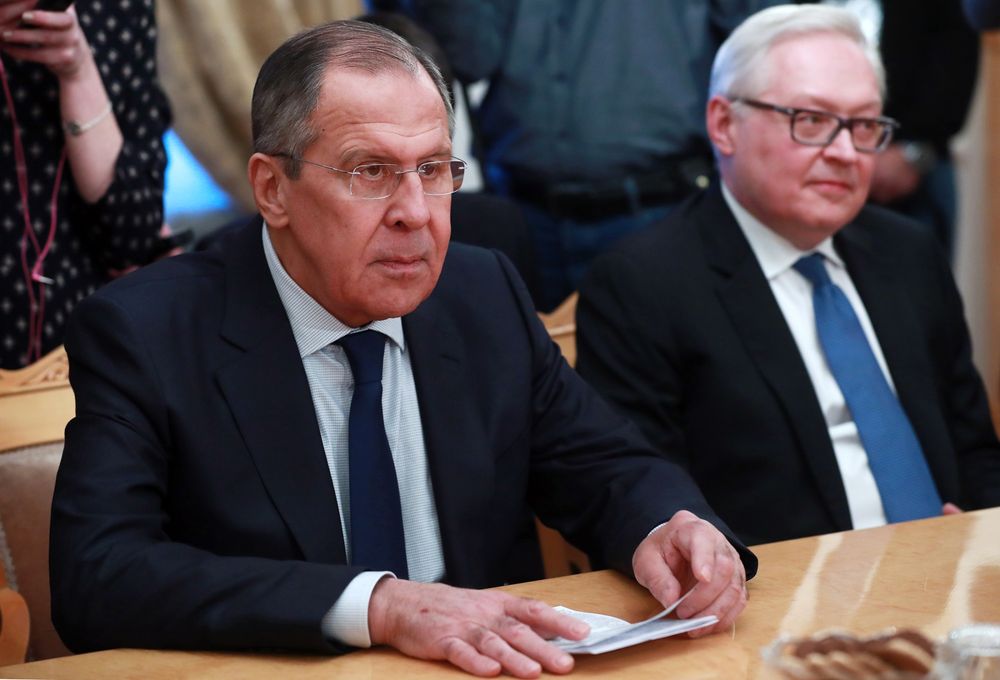
April 30, 2020 - The UN embargo on conventional weapons sales to Iran, which expires in October 2020, can’t be extended despite US efforts to prevent its expiration, the Russian Deputy Foreign Minister has stated.
“For us, the case of the existing ban on arms deliveries to and from Iran was closed with the adoption of Resolution 2231. The embargo regime expires in October this year”, Deputy Foreign Minister Sergei Ryabkov stated.
Ryabkov went on to blame the US for its selective approach to Resolution 2231. He recalled that Washington itself had stopped adhering to its provisions two years ago and has since spared no effort to prevent other nations from remaining in compliance with the resolution by introducing unilateral sanctions.
“Instead of discussing which provisions of Resolution 2231 could be used to achieve certain political goals, the US would be better off ensuring the full and comprehensive implementation of the provisions of this resolution, and return to full compliance with the JCPOA”, the Deputy Foreign Minister added.
US Claim of Still Being Participant of JCPOA ‘Unprecedented Historical Joke’: Iran Envoy
April 30, 2020 - Iran’s Ambassador and Permanent Representative to the United Nations Majid Takht-Ravanchi said any US attempt to extend an arms embargo against Iran would run counter to the UN Security Council Resolution 2231.
In an interview with IRNA on Wednesday, Takht Ravanchi slammed the US’ claim about being still a participant of the 2015 Iran nuclear deal as an unprecedented historical joke.
He said that with its unilateral exit from the Joint Comprehensive Plan of Action (JCPOA) two years ago, the United States violated its commitments under the 2015 multilateral accord and a subsequent UNSC Resolution 2231 as well.
After U.S., Israeli pressure, Germany bans Hezbollah activity, raids mosques
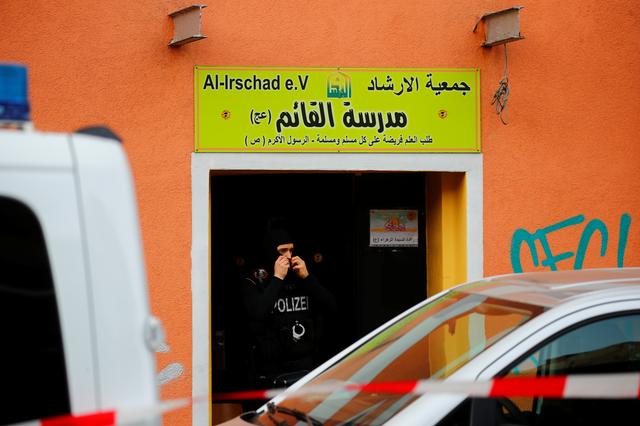
Germany banned all Hezbollah activity on its soil on Thursday and designated the Iran-backed group a terrorist organisation, a much-anticipated step long urged by Israel and the United States.
Syria Denounces Germany Designation of Hezbollah as a Terrorist Organization: Ministry
April 30, 2020 - Syria Foreign Ministry said on Thursday that the Syrian Arab Republic condemns, in the strongest terms, the German government’s decision that considers Hezbollah as terrorist organization.
“The German government decision frankly embodies its yielding to the dictates of the world Zionism and its heinous subjection to the US policies which support the occupation entity,” a source at the Foreign Ministry said.
It added that Syria sees the unjust decision as a legion of honor for Hezbollah and a clear recognition of its role in resisting the Zionist aggression and foiling the western projects which target the higher interests of the Arab nation.
Hezbollah Precision-guided Missiles Will Cause Mass Destruction in ’Israel’, Al-Manar Psychological Warfare Exacerbates Losses: Zionist Report
April 30, 2020 - The Zionist website, Netsif Net, published a report in which it cited warnings issued by an Israeli veteran officer of the danger posed by Hezbollah missiles, blaming the failure to address this peril on the enemy’s officials.
Pompeo urges end to overflight rights for Iran airline flying to Venezuela
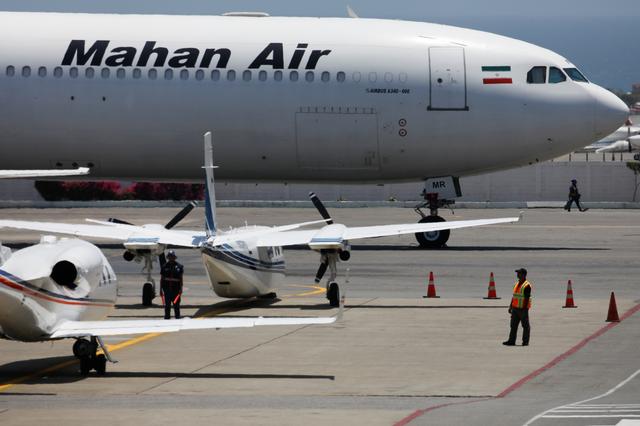
U.S. Secretary of State Mike Pompeo on Wednesday called on countries to deny overflight rights to Mahan Air, an Iranian airline under U.S. sanctions, which he said recently delivered cargoes of "unknown support" to the Venezuelan government.
Nearly 90% of U.S. House of Representatives members have signed a letter urging the Trump administration to increase its diplomatic action at the United Nations to renew an arms embargo on Iran, congressional sources said on Thursday.
U.S. 'hopeful' U.N. will extend Iran arms embargo, Russia 'negative'
The United States is "hopeful" the U.N. Security Council will extend an arms embargo on Iran before it expires in October, a top U.S. State Department envoy said on Thursday, despite a key Russian official signaling that Moscow opposed such a move.
U.S. will not let Iran buy arms when U.N. embargo ends: Pompeo
The United States will not allow Iran to purchase conventional arms after a U.N. prohibition on this expires in October, U.S. Secretary of State Mike Pompeo said on Wednesday.
Moscow: UN Weapons Embargo on Iran Can’t Be Prolonged Despite US Efforts

April 30, 2020 - The UN embargo on conventional weapons sales to Iran, which expires in October 2020, can’t be extended despite US efforts to prevent its expiration, the Russian Deputy Foreign Minister has stated.
“For us, the case of the existing ban on arms deliveries to and from Iran was closed with the adoption of Resolution 2231. The embargo regime expires in October this year”, Deputy Foreign Minister Sergei Ryabkov stated.
Ryabkov went on to blame the US for its selective approach to Resolution 2231. He recalled that Washington itself had stopped adhering to its provisions two years ago and has since spared no effort to prevent other nations from remaining in compliance with the resolution by introducing unilateral sanctions.
“Instead of discussing which provisions of Resolution 2231 could be used to achieve certain political goals, the US would be better off ensuring the full and comprehensive implementation of the provisions of this resolution, and return to full compliance with the JCPOA”, the Deputy Foreign Minister added.
UN Resolution 2231 adopted back in 2015 alongside the Iran nuclear deal, prohibited the sale of conventional weapons to the Islamic Republic until 18 October 2020 and separately the sale of missiles until 2023. However, US Secretary of State Mike Pompeo stated yesterday that Washington is planning to do anything in its power to extend the ban beyond October 2020 and will apply to the UN to do that.
Pompeo mulled resorting to a mechanism that renews international sanctions against the Islamic Republic by declaring that it violated the nuclear deal inked in 2015, but was later abandoned by the US in 2018. The secretary of state claims the US is still formally a party to the deal and that Washington will seek help from its European allies, signatories to the deal, in this matter. UN inspections, however, revealed that Iran complied with the deal as it promised in 2015.
US Claim of Still Being Participant of JCPOA ‘Unprecedented Historical Joke’: Iran Envoy
April 30, 2020 - Iran’s Ambassador and Permanent Representative to the United Nations Majid Takht-Ravanchi said any US attempt to extend an arms embargo against Iran would run counter to the UN Security Council Resolution 2231.
In an interview with IRNA on Wednesday, Takht Ravanchi slammed the US’ claim about being still a participant of the 2015 Iran nuclear deal as an unprecedented historical joke.
He said that with its unilateral exit from the Joint Comprehensive Plan of Action (JCPOA) two years ago, the United States violated its commitments under the 2015 multilateral accord and a subsequent UNSC Resolution 2231 as well.
After U.S., Israeli pressure, Germany bans Hezbollah activity, raids mosques
Germany banned all Hezbollah activity on its soil on Thursday and designated the Iran-backed group a terrorist organisation, a much-anticipated step long urged by Israel and the United States.
Syria Denounces Germany Designation of Hezbollah as a Terrorist Organization: Ministry
April 30, 2020 - Syria Foreign Ministry said on Thursday that the Syrian Arab Republic condemns, in the strongest terms, the German government’s decision that considers Hezbollah as terrorist organization.
“The German government decision frankly embodies its yielding to the dictates of the world Zionism and its heinous subjection to the US policies which support the occupation entity,” a source at the Foreign Ministry said.
It added that Syria sees the unjust decision as a legion of honor for Hezbollah and a clear recognition of its role in resisting the Zionist aggression and foiling the western projects which target the higher interests of the Arab nation.
Hezbollah Precision-guided Missiles Will Cause Mass Destruction in ’Israel’, Al-Manar Psychological Warfare Exacerbates Losses: Zionist Report
April 30, 2020 - The Zionist website, Netsif Net, published a report in which it cited warnings issued by an Israeli veteran officer of the danger posed by Hezbollah missiles, blaming the failure to address this peril on the enemy’s officials.
The report mentioned that it had one day earlier quoted a US veteran officer as warning of the harm expected to be inflicted on ‘Israel’ by Hezbollah missiles and describing them as a weapon of mass destruction.
The report added that the veteran Israeli officer, Zvika Haimovich, who served as an air defense commander, expressed his worries about the same threat but with a soft rhetoric, noting that he warned of a large number of Hezbollah precision-guided missiles.
Haimovich called on the Israelis to prepare themselves to encounter an unprecedented threat, according to the report which added that the number of Hezbollah missiles as confirmed by ‘Israel’ has reached 150 thousand.
The Israeli report blamed the army officers who hide all the dangers which threaten the entity during their service year and disclose them after they retire, wondering how they observe the professional integrity.
Netsif Net pointed out that Hezbollah TV Channel Al-Manar launches a psychological warfare against the Israelis based on the reports about Hezbollah augmenting military power, adding the Zionists themselves have started to recognize this threat.
Pompeo urges end to overflight rights for Iran airline flying to Venezuela
U.S. Secretary of State Mike Pompeo on Wednesday called on countries to deny overflight rights to Mahan Air, an Iranian airline under U.S. sanctions, which he said recently delivered cargoes of "unknown support" to the Venezuelan government.
angelburst29
The Living Force
Iran's OPEC Governor Hossein Kazempour Ardebili is in a coma after a "severe brain haemorrhage", SHANA, the news site of the Iranian oil ministry, reported on Sunday.
Iran's OPEC governor in coma after brain haemorrhage

May 3, 2020 - He was hospitalized on Friday, SHANA said, without providing any additional details.
Kazempour Ardebili is a key figure in Iran’s oil industry and served as the country’s deputy foreign minister and deputy oil minister in the 1980s. He was ambassador to Japan in the early 1990s, while at the same time serving as OPEC governor.
Hezbollah: Germany bowing to U.S. will with ban
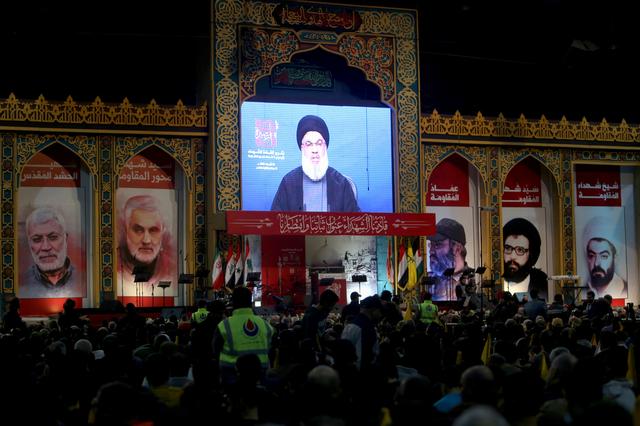
The leader of Lebanon's Hezbollah said on Monday that Germany was "succumbing to American will" by banning his Iran-backed movement and designating it a terrorist organization.
Iran says U.S. push to extend Tehran's arms embargo is 'illegitimate'
Iran dismissed as "illegitimate" efforts by the United States to extend the U.N. Security Council arms embargo on Tehran, an Iranian Foreign Ministry spokesman said on Monday.
Iran's coronavirus death toll rises by 74 as mosques due to reopen
The coronavirus death toll in Iran, one of the hardest hit countries in the Middle East, rose by 74 in the past 24 hours to 6,277, the Health Ministry said on Monday, as mosques were due to reopen in many cities.
Iran coronavirus death toll rises by 47 to 6,203: health ministry
The death toll from the new coronavirus outbreak in Iran rose by 47 over the past 24 hours to 6,203, Health Ministry spokesman Kianush Jahanpur said on state TV on Sunday.
Mosques and schools to reopen in Iran's low-risk areas

Iran plans to reopen mosques and schools in areas that have been consistently free of the coronavirus as President Hassan Rouhani's government starts to ease restrictions that were aimed at containing the outbreak.
US sanctions Iranian-Iraqi businessman over support of Iran's Quds Force
![The Commander of Iran's Quds Force Esmail Ghaani, 30 March 2020 [Twitter] The Commander of Iran's Quds Force Esmail Ghaani, 30 March 2020 [Twitter]](/forum/proxy.php?image=https%3A%2F%2Fi1.wp.com%2Fwww.middleeastmonitor.com%2Fwp-content%2Fuploads%2F2020%2F04%2FEsmail-Ghaani.jpg%3Fresize%3D1200%252C800%26quality%3D85%26strip%3Dall%26ssl%3D1&hash=2edb6138a751778e578c6311bf088c85)
The Commander of Iran's Quds Force Esmail Ghaani, 30 March 2020 [Twitter]
May 1, 2020 - The United States on Friday imposed sanctions on an Iranian-Iraqi businessman and his mining company, accusing him of involvement in efforts by Iran’s elite Quds Force to generate revenue illegally and smuggle weapons abroad, the US Treasury Department said, Reuters reported.
Amir Dianat has supported Quds Force smuggling operations for years, including efforts aimed at shipping weapons such as missiles and smuggling shipments from Iran to Yemen, the department said in a statement.
The sanctions freeze any US-held assets of Dianat or his company Taif Mining Services, which the US Treasury Department alleged was a front company for the Quds Force, and generally bar Americans from dealing with them.
“The Iranian regime and its supporters continue to prioritize the funding of international terrorist organizations over the health and well-being of the Iranian people,” Treasury Secretary Steven Mnuchin said in the statement.
In addition to the blacklisting, the US Attorney’s Office for the District of Columbia filed criminal charges against Dianat and his business associate, Iranian Kamran Lajmiri, alleging they violated sanctions and money laundering laws.
A related complaint was also filed alleging that $12 million is subject to forfeiture as funds involved in the crimes and as assets of a foreign terrorist organization, the US Department of Justice said in a statement.
The forfeiture action marks the largest ever seizure of Quds Force-related funds, it said.
The complaint alleges that Dianat and Lajmiri in 2019 conspired to purchase a petroleum tanker in a scheme involving the National Iranian Oil Company, the National Iranian Tanker Company and the Quds Force, all blacklisted by the United States.
If convicted of the criminal charges, Dianat and Lajmiri would face a maximum of 20 years imprisonment.
“These defendants purchased a crude oil tanker valued at over $10 million by illegally using the US financial system, defiantly violating US sanctions,” Assistant Attorney General for National Security John Demers said in the statement.
Iran's OPEC governor in coma after brain haemorrhage
May 3, 2020 - He was hospitalized on Friday, SHANA said, without providing any additional details.
Kazempour Ardebili is a key figure in Iran’s oil industry and served as the country’s deputy foreign minister and deputy oil minister in the 1980s. He was ambassador to Japan in the early 1990s, while at the same time serving as OPEC governor.
Hezbollah: Germany bowing to U.S. will with ban
The leader of Lebanon's Hezbollah said on Monday that Germany was "succumbing to American will" by banning his Iran-backed movement and designating it a terrorist organization.
Iran says U.S. push to extend Tehran's arms embargo is 'illegitimate'
Iran dismissed as "illegitimate" efforts by the United States to extend the U.N. Security Council arms embargo on Tehran, an Iranian Foreign Ministry spokesman said on Monday.
Iran's coronavirus death toll rises by 74 as mosques due to reopen
The coronavirus death toll in Iran, one of the hardest hit countries in the Middle East, rose by 74 in the past 24 hours to 6,277, the Health Ministry said on Monday, as mosques were due to reopen in many cities.
Iran coronavirus death toll rises by 47 to 6,203: health ministry
The death toll from the new coronavirus outbreak in Iran rose by 47 over the past 24 hours to 6,203, Health Ministry spokesman Kianush Jahanpur said on state TV on Sunday.
Mosques and schools to reopen in Iran's low-risk areas
Iran plans to reopen mosques and schools in areas that have been consistently free of the coronavirus as President Hassan Rouhani's government starts to ease restrictions that were aimed at containing the outbreak.
US sanctions Iranian-Iraqi businessman over support of Iran's Quds Force
![The Commander of Iran's Quds Force Esmail Ghaani, 30 March 2020 [Twitter] The Commander of Iran's Quds Force Esmail Ghaani, 30 March 2020 [Twitter]](/forum/proxy.php?image=https%3A%2F%2Fi1.wp.com%2Fwww.middleeastmonitor.com%2Fwp-content%2Fuploads%2F2020%2F04%2FEsmail-Ghaani.jpg%3Fresize%3D1200%252C800%26quality%3D85%26strip%3Dall%26ssl%3D1&hash=2edb6138a751778e578c6311bf088c85)
The Commander of Iran's Quds Force Esmail Ghaani, 30 March 2020 [Twitter]
May 1, 2020 - The United States on Friday imposed sanctions on an Iranian-Iraqi businessman and his mining company, accusing him of involvement in efforts by Iran’s elite Quds Force to generate revenue illegally and smuggle weapons abroad, the US Treasury Department said, Reuters reported.
Amir Dianat has supported Quds Force smuggling operations for years, including efforts aimed at shipping weapons such as missiles and smuggling shipments from Iran to Yemen, the department said in a statement.
The sanctions freeze any US-held assets of Dianat or his company Taif Mining Services, which the US Treasury Department alleged was a front company for the Quds Force, and generally bar Americans from dealing with them.
“The Iranian regime and its supporters continue to prioritize the funding of international terrorist organizations over the health and well-being of the Iranian people,” Treasury Secretary Steven Mnuchin said in the statement.
In addition to the blacklisting, the US Attorney’s Office for the District of Columbia filed criminal charges against Dianat and his business associate, Iranian Kamran Lajmiri, alleging they violated sanctions and money laundering laws.
A related complaint was also filed alleging that $12 million is subject to forfeiture as funds involved in the crimes and as assets of a foreign terrorist organization, the US Department of Justice said in a statement.
The forfeiture action marks the largest ever seizure of Quds Force-related funds, it said.
The complaint alleges that Dianat and Lajmiri in 2019 conspired to purchase a petroleum tanker in a scheme involving the National Iranian Oil Company, the National Iranian Tanker Company and the Quds Force, all blacklisted by the United States.
If convicted of the criminal charges, Dianat and Lajmiri would face a maximum of 20 years imprisonment.
“These defendants purchased a crude oil tanker valued at over $10 million by illegally using the US financial system, defiantly violating US sanctions,” Assistant Attorney General for National Security John Demers said in the statement.
Trending content
-
Thread 'Coronavirus Pandemic: Apocalypse Now! Or exaggerated scare story?'
- wanderingthomas
Replies: 30K -
-
-
